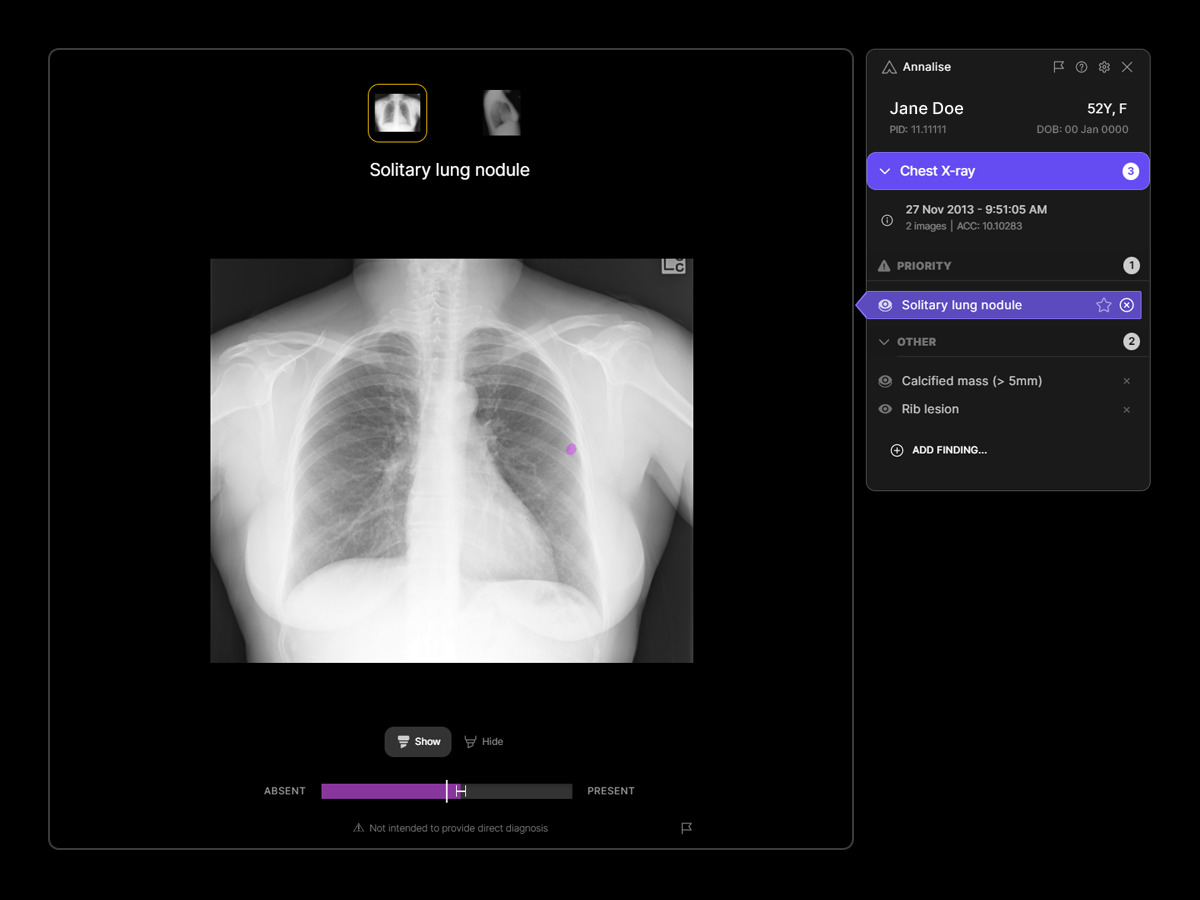Published on: 23 October 2024
Technology to help catch lung cancer quicker is set to be rolled out across the NHS in the North East and North Cumbria after a successful bid for national funding.
A new artificial intelligence (AI) tool will be added to X-ray kit at hospitals who are members of the region’s Imaging Network.
The collaboration with Annalise.ai has been secured thanks to a successful bid for funding through the region’s Imaging Network, supported by the Provider Collaborative which sees all NHS Foundation Trusts working together.
A clinician using the AI system to review a patient's x-ray.
The bid was also supported by the Northern Cancer Alliance with funding awarded through NHS England’s AI Diagnostic Fund (AIDF) which provides £21 million to 12 imaging networks, covering 65 NHS trusts across England.
Lung cancer is the UK’s biggest cancer killer, with almost 35,000 deaths a year and cases rising in women. It is responsible for one in five of all cancer deaths. If caught early, it is easier to treat and there are better chances of survival.
Six in 10 people will survive more than five years if lung cancer is diagnosed at the earlier stages, but this falls to just one in 10 for those diagnosed at the latest stage.
The North East and North Cumbria is home to around 3 million people, with some of the starkest health inequalities in the UK (5). This means early death rates and the highest number of people living in poor health in England.
Lung cancer is the leading cause of cancer death in the North East and North Cumbria.
It also has the highest incidence in England, with 117 people per every 100,000 developing the disease. This compares to 88.5 people per 100,000 in London.
The disease has many causes, but the fact that more people in our region have smoked across the generations, compared to the national average, and the fact the North East and North Cumbria has some of the poorest communities, where residents already face significant health inequalities, is part of it.
The AI technology acts like a second pair of eyes for clinicians, with the ability to prioritise cases where the X-ray has found something suspicious which may indicate possible lung cancer. It has been shown to improve diagnostic accuracy by 45% and increase diagnostic efficiency by 12%.

How the screen looks to a clinician as they review an x-ray using the AI software.
Following recent NICE guidance, the trusts within the region’s Imaging Network will evaluate how well the technology performs as it is incorporated into its radiology departments.
It will be rolled out at:
- North Cumbria Integrated Care NHS Trust
- Gateshead Health NHS Foundation Trust
- Northumbria Healthcare NHS Foundation Trust
- South Tyneside and Sunderland NHS Foundation Trust
- North Tees and Hartlepool NHS Foundation Trust
- South Tees NHS Foundation Trust
- County Durham and Darlington NHS Foundation Trust
Ken Bremner MBE is Chair of the North East and North Cumbria Provider Collaborative and Senior Responsible Officer for the region’s imaging network. He is also Chief Executive of South Tyneside and Sunderland NHS Foundation Trust.
He said:
"The arrival of this technology for the region’s NHS is a very welcome addition to our fight against lung cancer and the terrible impact it has on our region’s communities.
"By using the AI tool, we will be able to improve the time it takes for treatment to begin for anyone who receives a lung cancer diagnosis. It will help us to save people’s lives and, importantly, catch more cases quickly.
"The earlier we can start treatment for lung cancer the better and so this will go some way to make that difficult time following a diagnosis easier for patients as they start their treatment journey.
"To secure this funding shows by working together through the region’s Imaging Network and Provider Collaborative, we can bring in innovations and improvements which will help people live better lives. We know the demand for diagnostics is rising all the time and so this will help us work smarter and quicker."
The new AI technology has been created by Annalise.ai, a health technology company which specialises in using AI and medical imaging.
Dimitry Tran, co-founder and Deputy CEO at Annalise.ai said:
"Following successful deployment in multiple NHS sites in the last two years, we are delighted that this announcement means our solution can be deployed across the North East and North Cumbria and beyond.
"This will unlock significant benefits for many more patients and clinicians alike.
"Our solutions are of the highest quality, rigorously validated, and engineered to meet the needs of hard-working clinicians supporting patients across England.
"This announcement shows a real commitment from NHS England to introducing innovation that makes a real difference to clinicians on the front line.
"We look forward to further collaborations with our colleagues in the NHS, supporting them to continue delivering the highest standards of patient care – both now and into the future.”
Secretary of State for Science, Innovation and Technology, Peter Kyle said:
"As someone who has lost their mum and dad to cancer, I know how important it is to accelerate medical innovation, through genuine collaborations like this one, to prevent this disease from breaking up families.
"The roll out of this AI tool in the North East and North Cumbria’s hospitals proves that by working together, researchers, businesses and our NHS can harness the potential of emerging technologies to save lives up and down the country."







